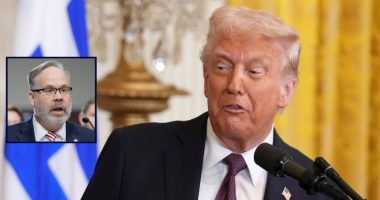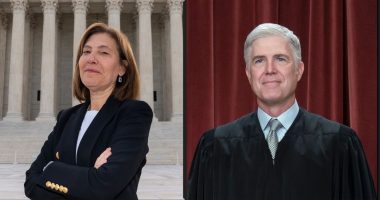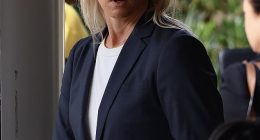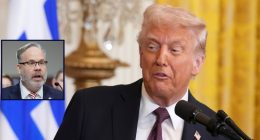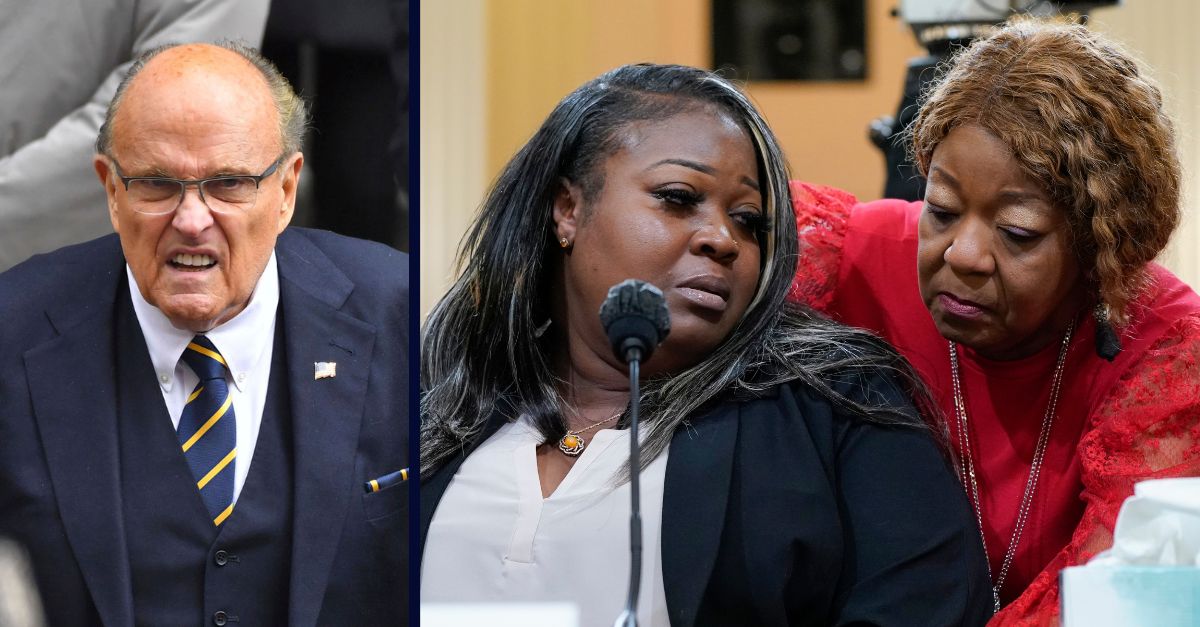
Left: Former Mayor of New York City Rudy Giuliani at the funeral service for NYPD police officer Wilbert Mora at St. Patrick’s Cathedral on February 2, 2022 in Midtown Manhattan, New York City (AP Photo/File). Right: Wandrea “Shaye” Moss, a former Georgia election worker, is comforted by her mother Ruby Freeman, right, at a hearing for the House select committee investigating the Jan. 6 attack on the U.S. Capitol. (AP Photo/Jacquelyn Martin, File).
The two election workers who found themselves at the center of a firestorm after Rudy Giuliani falsely accused them of voter fraud during the 2020 presidential election say that the Donald Trump-allied lawyer has withheld key evidence in their defamation case against him, and that he deserves to lose the case because of it.
Ruby Freeman and her daughter Wandrea “Shaye” Moss sued Giuliani in December 2021, alleging defamation and intentional infliction of emotional distress resulting from his accusations that the women were engaging in voter fraud during the 2020 presidential election. Giuliani accused the women of, among other things, locking the doors to State Farm Arena in Atlanta, Georgia, in order to keep election observers out, passing each other a USB drive in order to manipulate the vote count, and hiding suitcases full of illegal ballots.
Multiple investigations yielded no proof to support these claims, and the Georgia Board of Elections recently — and unequivocally — cleared the women of any wrongdoing. What Giuliani claimed was a nefarious USB drive was actually a “ginger mint,” as Moss testified before Congress.
Since the lawsuit was filed, however, Giuliani has failed to preserve and disclose key evidence, the plaintiffs say in a sanctions motion filed Tuesday. His “recalcitrance,” lawyers for Freeman and Moss argue, warrants significant sanctions — in the form of a default judgment.
“The only explanation for why Defendant Giuliani failed to take any steps to preserve the Electronic Evidence, let alone reasonable steps, is that he did so deliberately to deny Plaintiffs (and the scores of other plaintiffs and government entities litigating and investigating his actions during and after the 2020 Presidential Election) evidence that would be helpful to their case,” the motion says.
Discovery not from Giuliani, but from third parties, “mak[es] clear what Plaintiffs suspected all along: there exists, somewhere in various accounts and devices, documentary evidence that goes to the heart of Plaintiffs claims.”
For example, Freeman and Moss learned of a text exchange between Boris Epshteyn, an advisor to the 2020 Trump campaign, and Giuliani about alleged examples of voter fraud.
“Urgent POTUS request need best examples of ‘election fraud’ that we’ve alleged that’s super easy to explain,” Epshteyn wrote in a group text on Dec. 7, 2020, according to the filing. “Doesn’t necessarily have to be proven, but does need to be easy to understand. Is there any sort of ‘greatest hits’ clearinghouse that anyone has for best example?””
“The security camera in Atlanta alone captures theft of a minimum of 30,000 votes which alone would change result in Georgia,” Giuliani replied.
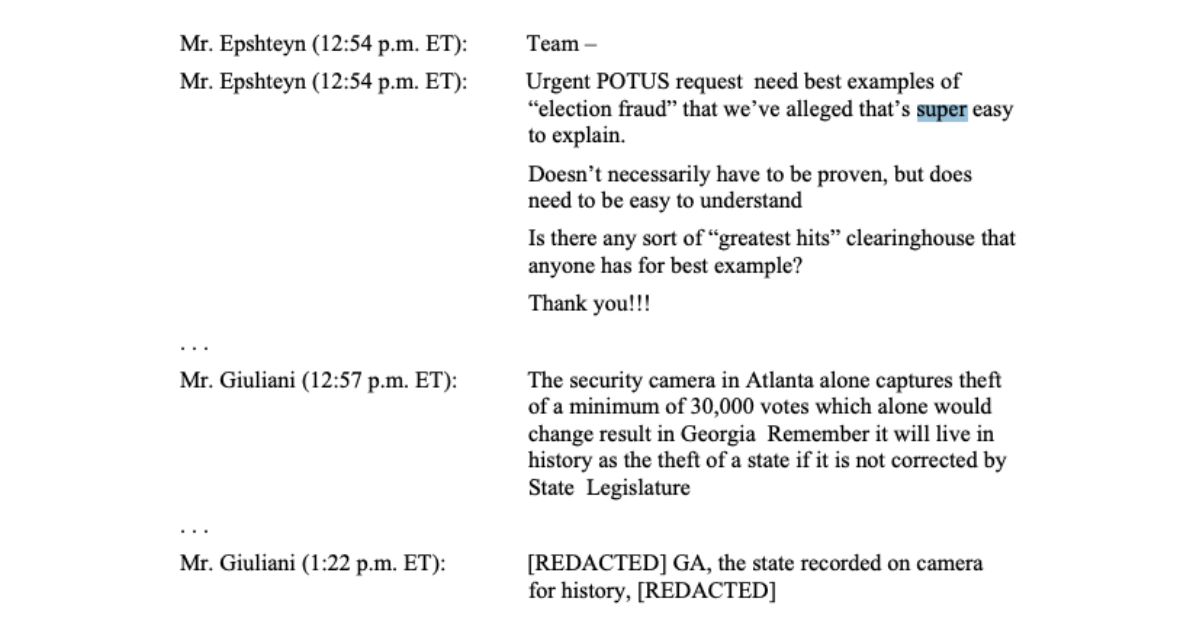
via court filing
This exchange — which is relevant to the plaintiffs’ defamation claim — was never produced by Giuliani, nor was it listed on a privilege log, the plaintiffs’ motion says.
The motion also cites evidence from another third party — former One America News host and Trump attorney Christina Bobb — as proof that Giuliani failed to share electronic records.
“That production yielded a text thread with Defendant Giuliani discussing sending a video of Plaintiffs to Rusty Bowers, then the Speaker of the Arizona House of Representatives, and an August 17, 2022, direct message with Ms. Bobb on Instagram, which Defendant has never produced.”
This type of evidence, the plaintiffs say, is crucial to proving Giuliani’s state of mind when he made his statements about Freeman and Moss.
According to the plaintiffs, it’s not just electronic evidence that has gone missing.
“[A]t least one third-party, Katherine Friess, with whom Defendant Giuliani was in close contact when he first began making his claims about Plaintiffs and was working with Defendant Giuliani in the aftermath of the 2020 election, has vanished,” the motion says. “Despite months of efforts, including extensive investigation […] Ms. Friess has never responded to Plaintiffs’ subpoenas nor provided documentary evidence, and Defendant Giuliani has declined to say where she might be.”
As Law&Crime previously reported, Friess was included in a list of witnesses Giuliani purportedly planned to call on his behalf in order to defend his license — unsuccessfully, it appears — to practice law in Washington.
Lawyers for Freeman and Moss argue that Giuliani’s actions amount to “a sophisticated party’s abuse of judicial process designed to avoid accountability, at enormous expense to the parties and this Court,” and that the “severe” sanction of a default judgment is warranted.
Despite being an “attorney with over half a century of experience,” the motion says, Giuliani has “transparently flouted his discovery obligations at every turn.”
“Defendant Giuliani should know better,” the motion also says.
The case is before U.S. District Judge Beryl Howell, who, as the motion notes, previously told Giuliani that “not deleting documents is not the same as preserving the information in a manner that can be retrieved and searched.”
The motion says that the parties had spent two full days negotiating a potential settlement agreement shortly before this motion was filed, but it fell through at the last minute — because Giuliani wouldn’t agree to the terms.
Attorneys for Giuliani did not immediately respond to Law&Crime’s request for comment.
You can read the plaintiffs’ motion, below.
Have a tip we should know? [email protected].com

